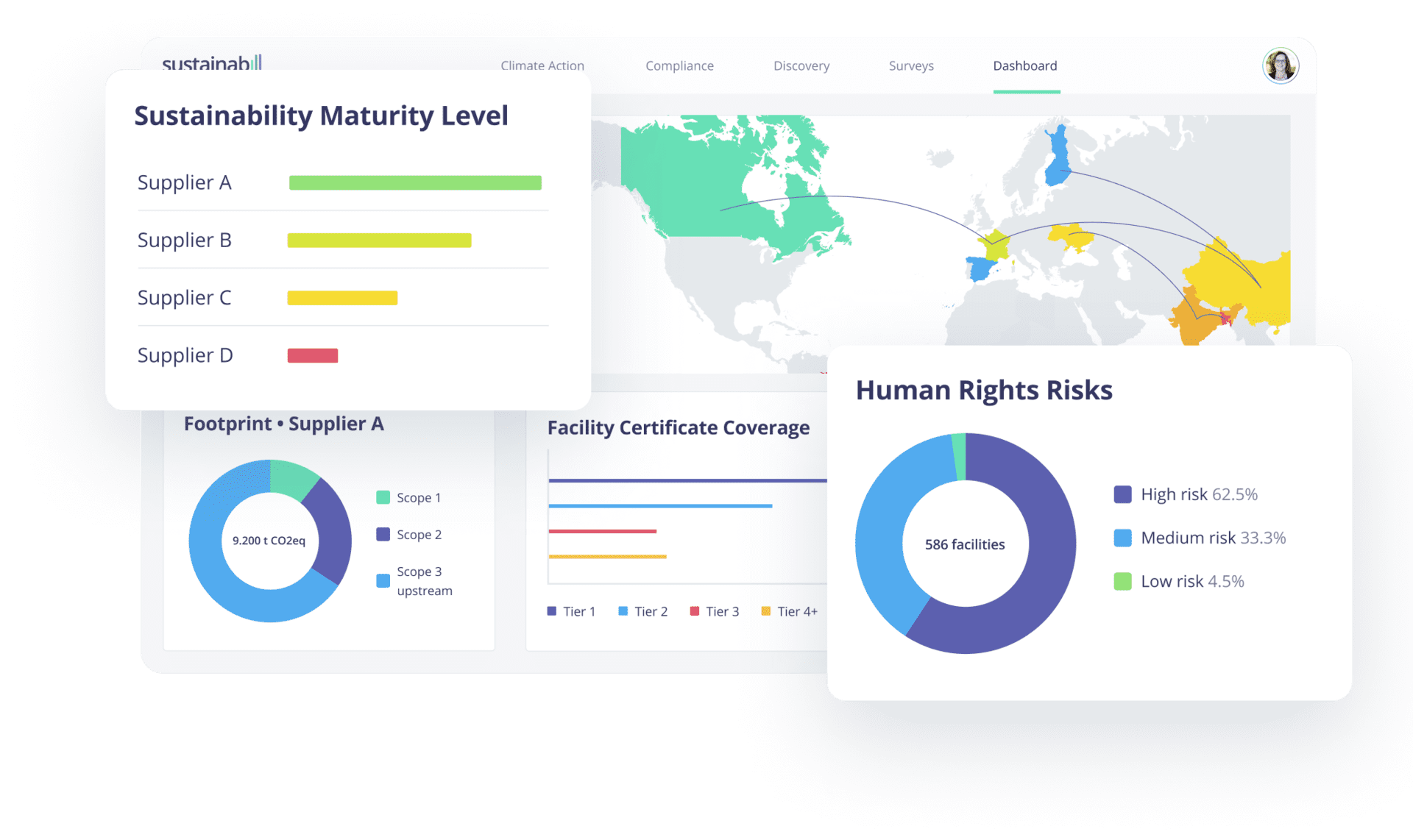With sustainabill, we have found a solution to engage with suppliers on the right issues and bring about change in the supply chain.
Head of Strategic Purchasing
As the list of supply chain due diligence regulations continues to grow, companies are increasingly required to ensure compliance with human rights and environmental regulations. To avoid sanctions and fines, purchasing teams need transparency in the supply chain.
With the sustainabill cloud platform, you achieve transparency in an automated and future-proof manner!
Many governments around the world are increasingly enforcing laws to ensure responsible business practices and take action to respect human rights and the environment. Under these national laws, companies must monitor the impact of their operations on people and the environment and report on their efforts. These regulations include:
California Supply Chain Transparency Act
Large companies in California are required to disclose information about their efforts to eliminate human trafficking and slavery within their supply chains.
United Kingdom Modern Slavery Act
Companies operating in the UK are required to report on their due diligence efforts to combat modern slavery in their operations and supply chains.
Australian Modern Slavery Act
Large companies in Australia are required to report annually on the risks of modern slavery in their operations and supply chains, as well as the actions taken to mitigate these risks.
Uyghur Forced Labor Prevention Act
Importers must perform due diligence, effectively track the supply chain, and take measures to ensure that no goods or materials originate from the XUAR at risk of forced labor.
Swiss legislation on conflict minerals and child labor
Large companies must report on non-financial information, including environmental and human rights issues. This introduces due diligence in the supply chain with regard to conflict minerals and child labor.
Norwegian Transparency Act
Large companies are required to transparently comply with basic human rights and decent working conditions in their supply chains.
Companies affected by these laws must adequately fulfill their due diligence obligations with respect to human rights and certain environmental aspects. These include:

A proactive and holistic risk management system in the supply chain is crucial for the efficient fulfillment of due diligence obligations.
Risk management should be guided by the requirements of the UN Guiding Principles on Business and Human Rights. The principles were adopted in 2011 with the aim of combating child labor, exploitation and slavery and anchoring greater responsibility for respecting human rights among companies. All national and future standards around due diligence are based on these principles. To this end, it is also important to enable transparency in the upstream supply chain, especially since this is usually where the greatest risks lie hidden.

The recurring requirements listed below are effort drivers for procurement teams, as they require the acquisition and evaluation of data from suppliers and their reporting. The automation of the sustainabill cloud platform can save significant resources and ensure efficient implementation.
The sustainabill cloud platform provides a basis for communication with suppliers to request information and process changes via the platform and subsequently mitigate risks. It enables end2end risk analysis including reporting, thanks to automated reports and dashboard data. Risk mapping allows you to uncover supplier relationships and plausibilize risks.
Purchasing organizations can have many thousands of suppliers. The sustainabill Cloud platform enables automated risk mapping for 100% of your suppliers to identify suppliers with material risks.
In addition, the sustainabill Cloud Platform can be used to create transparency about which risk mitigation measures suppliers have already implemented, where the operating sites are located, and where the raw materials of the products come from. Easily obtain supplier self-assessments and monitor thousands of suppliers.
Review your suppliers’ processes, request evidence, communicate and review improvement measures.
Your buyers have a clear overview of the suppliers’ progress at all times. Automated multi-tier mapping can be used to create the necessary transparency across several supply chain levels for particularly risk-relevant commodity groups and raw materials.
Create and manage remedial actions by requesting certifications and audits from the violator, tracking implementation status, and managing appropriate evidence to stop the violation or minimize its severity.
With sustainabill, you have full transparency over your supply chains. This allows you to efficiently follow up on indications of violations – also regarding the upstream supply chain.
sustainabill now also offers you a grievance mechanism via our new partner LegalTegrity.
sustainabill enables qualified reporting for reporting to regulatory offices and for integration into the CSR report in accordance with the GRI standards.
sustainabill automatically documents the status of all data requests sent to suppliers. Thus, the platform offers an automated end-to-end process from self-disclosure to the implementation of measures to reporting.
The sustainabill cloud platform enables the efficient implementation of sustainability requirements such as those imposed by CSRD and the holistic management of ESG risks.
With the sustainabill cloud platform, you achieve an automated evaluation of your supplier data for a fast and efficient implementation of current and future regulatory requirements.
The compliance of the sustainabill cloud platform with the German Supply Chain Act was audited by the renowned law firm Taylor Wessing.
Based in Cologne, hosting on the Telekom Cloud in Germany, highest data security and full control over your own data for you and your suppliers.
lie in research projects of the renowned think tank of the Wuppertal Institute. The platform is made and hosted in Germany. We value the highest data protection standards and full control over our own data for all users.
is that the transformation to a sustainable economy cannot succeed without sustainably designed supply chains. And this requires digital solutions with a high degree of automation.
is to make sustainability in supply chains pragmatically implementable and scalable. The sustainabill cloud platform covers all relevant sustainability requirements.
Schedule a free initial consultation in which we will discuss your individual situation and show you what added value our solution can offer you. We will contact you shortly with a proposed meeting date.